
This Grammy winning recording of three complex, expressive works by three composers as different from each other as they were individually brilliant, was recorded in 1980 yet is still an essential reference for these pieces more than 25 years later. On the program:
1-2. Alban Berg's Violin Concerto "Dem Andenken eines Engels" ("To the Memory of an Angel")The duration is 25'49. This was Berg's last completed piece before his death; the composition is rooted in 12-tone theory, but with an atypical amount of free artistic creation afforded, so that it often sounds tonal or beautiful. In this author's opinion the piece would serve as an excellent introduction to the territory covered by Schoenberg, Webern, Berg, and others, mainly because it is so exciting and lush, with a great deal of memorable melodic content. Even Bach makes a cameo during the close of the second movement.
3-6. Igor Stravinsky's Violin Concerto in DThe piece opens with a dramatic chord flair before quickly developing a theme a little bit reminiscent of Christmastime. And as this is Stravinsky, the whole affair is marked by relentless creativity, wit, and a very wide range of expression. Lasting 21'39 and spanning four movements, at times exuberant and at times heartbreaking, the listener will be finding new nuances in this composition for years.
7. Maurice Ravel's "Tzigane"Technically not a violin concerto, at 9'31 this piece opens with four minutes of harrowing solo violin figures before some spooky new colors from the New York Philharmonic begin to enter. But while deceptively small in scale in the first half, this piece features a great deal of contrast, and before long a large number of variations in texture, rhythm, pace, and timbre occur with increasing urgency. Perlman really displays ferocity on this one, and each peak of energy from the whole orchestra is breathtaking.
Perlman and Ozawa have proved to make an excellent team, the former's great virtuosity and emotional impact matching beautifully with the latter's great instincts in timing, dynamics, and overall understanding of the music. The content of this recording proves that the tradition of 20th century composition is about much more than intellectual prowess and artistic austerity - it celebrates the human spirit in an unprecedented way.
Download54 Used & New from $3.89
 Pretaluz or "black light" is a fitting title for an album with such stark contrasts. Angolan songwriter and musician Waldemar Bastos sings of much joy and pain over nine beautiful songs, which contain elements of Afropop and tropicalia, frequently making strong use of guitar and rhythm. However, Bastos' voice is the highlight of the album - it ranges from warm and friendly to horrifically despairing, and gives all of the music a sense of emotional sincerity that distinguishes it from more typical worldbeat albums. Angolan pride is infused throughout the work, motivating a combination of African tradition with modern pop elements derived from many regions of the world. Finally it is worth noting while it's still August that "Rainha Ginga" makes for one of the greatest sun-tinged summer songs this author has yet heard.
Pretaluz or "black light" is a fitting title for an album with such stark contrasts. Angolan songwriter and musician Waldemar Bastos sings of much joy and pain over nine beautiful songs, which contain elements of Afropop and tropicalia, frequently making strong use of guitar and rhythm. However, Bastos' voice is the highlight of the album - it ranges from warm and friendly to horrifically despairing, and gives all of the music a sense of emotional sincerity that distinguishes it from more typical worldbeat albums. Angolan pride is infused throughout the work, motivating a combination of African tradition with modern pop elements derived from many regions of the world. Finally it is worth noting while it's still August that "Rainha Ginga" makes for one of the greatest sun-tinged summer songs this author has yet heard.


